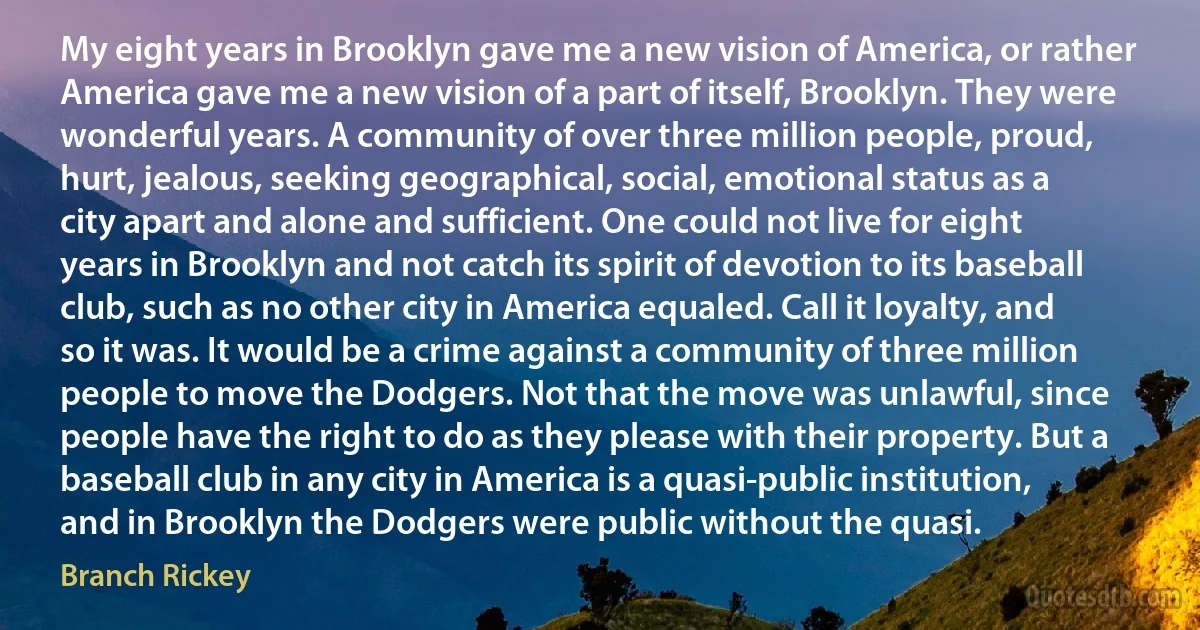
My eight years in Brooklyn gave me a new vision of America, or rather America gave me a new vision of a part of itself, Brooklyn. They were wonderful years. A community of over three million people, proud, hurt, jealous, seeking geographical, social, emotional status as a city apart and alone and sufficient. One could not live for eight years in Brooklyn and not catch its spirit of devotion to its baseball club, such as no other city in America equaled. Call it loyalty, and so it was. It would be a crime against a community of three million people to move the Dodgers. Not that the move was unlawful, since people have the right to do as they please with their property. But a baseball club in any city in America is a quasi-public institution, and in Brooklyn the Dodgers were public without the quasi.
Branch RickeyRelated topics
apart baseball call catch city club crime eight emotional geographical hurt institution live move people property public right seeking spirit three vision years brooklynRelated quotes
Let us imagine that the aboriginal-original human specimen was one of two brother apes, A and B; they were alike in every respect; both were animal space-binders; but something strange happened to B; he became the first time-binder, a human. ... He had thus a new faculty, he belonged to a new dimension; but, of course, he did not realize it; and because he had this new capacity he was able to analyze his brother "A"; he observed "A is my brother; he is an animal; but he is my brother; therefore, I AM AN ANIMAL." This fatal first conclusion, reached by false analogy, by neglecting a fact, has been the chief source of human woe for half a million years and it still survives. ... He [then] said to himself, "If I am an animal there is also in me something higher, a spark of some thing supernatural."

Alfred Korzybski
Masonically we are heirs of past. Our Masonic ancestors gave the craft devotion, loyalty and faith and made it an illustrious institution in the world. It should be our religious duty to appreciate and conserve the rich inheritance. In view of the increasing complexity of life and the maintenance of the best and highest traditions of the Craft, great care and concern should be displayed, if Freemasonry has to function in the best interests of humanity. It has been truly said, that an inspired and inspiring dedication to service should be the part of every Mason's life. Let us not give in to skepticism. There is all the difference between a pessimist and an optimist, in any field of human endeavour. One looks at his glass and cries "My glass is half empty”. The optimist looks and exclaims "My glass is half full”.

Jayachamarajendra Wadiyar
I HAVE never met with a man, either in England or America, who hath not confessed his opinion, that a separation between the countries, would take place one time or other: And there is no instance, in which we have shewn less judgment, than in endeavouring to describe, what we call, the ripeness or fitness of the Continent for independance. As all men allow the measure, and vary only in their opinion of the time, let us, in order to remove mistakes, take a general survey of things, and endeavour, if possible, to find out the very time. But we need not go far, the inquiry ceases at once, for, the time hath found us. The general concurrence, the glorious union of all things prove the fact. It is not in numbers, but in unity, that our great strength lies; yet our present numbers are sufficient to repel the force of all the world.

Thomas Paine
Contrary to several conflicting stories, I got the name "Count" right in Kansas City in 1936 while at the Reno Club. I was known as Bill Basie at that time. One night, while we were broadcasting, the announcer called me to the microphone for those usual few words of introduction. He commented that Bill Basie was a rather ordinary name, and further that there were a couple of well-known bandleaders named Earl Hines and Duke Ellington. Then he said, "Bill, I think I'll call you Count Basie from now on. Is that all right with you?" I thought he was kidding, shrugged my shoulders and replied, "OK." Well that was the last time I was ever introduced as Bill Basie. From then on, it was Count Basie, and I never did lose that nickname. It's funny the way those things will stick.

Count Basie
I exhibited three paintings at the Salon d'Automne exhibition [Paris], which is the most interesting exhibition I have seen until now. Much more interesting than the Secession [in München]. My paintings [two words cancelled] were noticed and praised by the art critics. I think I will be very famous here in a few years time. Reading my name in the newspapers and seeing people notice my paintings and write about them has given me new and strange joy. – Paris is a beautiful city. Why do you remain in the monotony of Munich's heavy atmosphere? Here one can find everything one desires. Everything is refined and has spirit and everyday one learns something new.. The French are more intelligent than I thought. They laugh a lot, but they understand better than the Germans what is refined, strange and outside the ordinary.

Giorgio de Chirico
